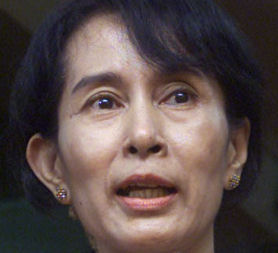Aung San Suu Kyi is free: what next for Burma?
Aung San Suu Kyi has been released from house arrest today, after a total of 15 years and 20 days in detention. What next? Author and human rights activist Benedict Rogers reports.

After 24 hours of uncertainty, rumour and anticipation, thousands gathered around the offices of Aung San Suu Kyi’s party, the National League for Democracy (NLD), and near her home in University Avenue to watch the pro-democracy leader as she has finally stepped out in public.
Her release, to massive cheers, was as visually momentous as Nelson Mandela’s walk out of prison in South Africa twenty years ago. There is, however, one key difference.
Mandela was freed because South Africa’s apartheid regime was crumbling, and FW de Klerk knew he had to reform. He engaged with Mandela to chart a peaceful transition to democracy, and Mandela’s release was part of a process of change. Mandela and de Klerk worked hand-in-hand.
In Burma, if the Generals have their way, there will be no change.
Aung San Suu Kyi has been freed not because Senior General Than Shwe, Burma‘s dictator, has compassion or a desire to reform, but as a public relations fig leaf to divert attention from last weekend’s sham elections, offensives against Burma’s ethnic groups and the regime’s crimes against humanity.
Aung San Suu Kyi: 'The Lady' of Burma
One of the world's most famous political prisoners, Aung San Suu Kyi has been detained for 15 out of the last 21 years. She was last freed in 2002.
Her release date come just days after the ruling military junta, under chairman of the State Peace and Development Council (SPDC) General Than Shwe, declared they had won the first elections in the country for 20 years - since Suu Kyi's NLD won a landslide victory in 1990.
Suu Kyi said she "would not dream" of taking part in Burma's elections and the NLD boycotted the vote, so the party was officially dissolved.
Read more - Aung San Suu Kyi: 'The Lady' of Burma
The question is what will happen next?
There will be a temptation among some in the international community to view Aung San Suu Kyi’s release as a step forward and therefore to ease pressure on the regime. Such a move would be a tragic mistake.
As Aung San Suu Kyi herself said when she was last released in 2002, “My release should not be looked at as a major breakthrough for democracy. For all people in Burma to enjoy basic freedom – that would be the major breakthrough”.
Real progress in Burma can be measured only when all political prisoners are released, a nationwide ceasefire in the ethnic areas is declared, and the regime engages in a meaningful dialogue with the democracy movement led by Aung San Suu Kyi and genuine representatives of Burma’s ethnic groups.
The regime’s widespread and systematic use of rape as a weapon of war, forced labour, torture and the recruitment of child soldiers must stop, and there must be access for international humanitarian organisations to all parts of the country.
The military must end its shoot-on-sight policy in which ethnic civilians, including the elderly, women and children are killed at point-blank range.
Since 1996, more than 3,500 villages in eastern Burma alone have been destroyed.
More from Channel 4 News on Burma
In other parts of the country, particularly Chin, Arakan and Kachin states in western and northern Burma, religious persecution of Christians and Muslims is a policy alongside rape and forced labour. Only when all the people of Burma, regardless of ethnicity and religion, are assured equal rights and real peace can we talk of progress.
To achieve this, the international community must now redouble its efforts. A carefully co-ordinated strategy of targeted pressure and high-level engagement must be developed. The past week has shown that the regime does care more about international opinion than we sometimes realise. Why else would they go through the motions of elections, albeit a sham and charade? Why else would they free Aung San Suu Kyi? The Generals do not like their pariah status.
The UN Secretary-General Ban Ki-moon must therefore take personal leadership of efforts to support the people of Burma in their struggle for freedom.
He must deploy all the resources available to him to revive a UN-led initiative to encourage dialogue in Burma. Dialogue is the one policy which unites everyone. The UN Security Council, General Assembly, Human Rights Council and Secretary-General, the European Union, the United States, the Association of South-East Asian Nations (ASEAN) and even China have called for dialogue.
Aung San Suu Kyi and the ethnic nationalities have both indicated their readiness to talk – indeed, dialogue and national reconciliation is the centrepiece of their platform.
The regime has taken a risk in releasing Aung San Suu Kyi today. Twenty-two years after she first won the hearts of her people during pro-democracy protests in Rangoon, she retains the most extraordinarily potent political role. She is as central and relevant to Burma’s politics as ever. No one else has the capacity to inspire, mobilise and unite people the way she can. Among the ethnic nationalities, she is the only Burman whom people speak of with genuine love and respect.
In taking this risk, the regime should now be urged to seize the opportunity it presents – to enter into dialogue, and chart a new future for Burma. The alternative is increased political tension and an escalation in ethnic conflict. This is a carpe diem moment for Burma, and for the international community. Let it not be yet another missed opportunity.
Benedict Rogers is a human rights activist working with Christian Solidarity Worldwide (CSW) based in London. He has made more than 30 visits to Burma and its borderlands, and is the author of Than Shwe: Unmasking Burma’s Tyrant (Silkworm Books, 2010).